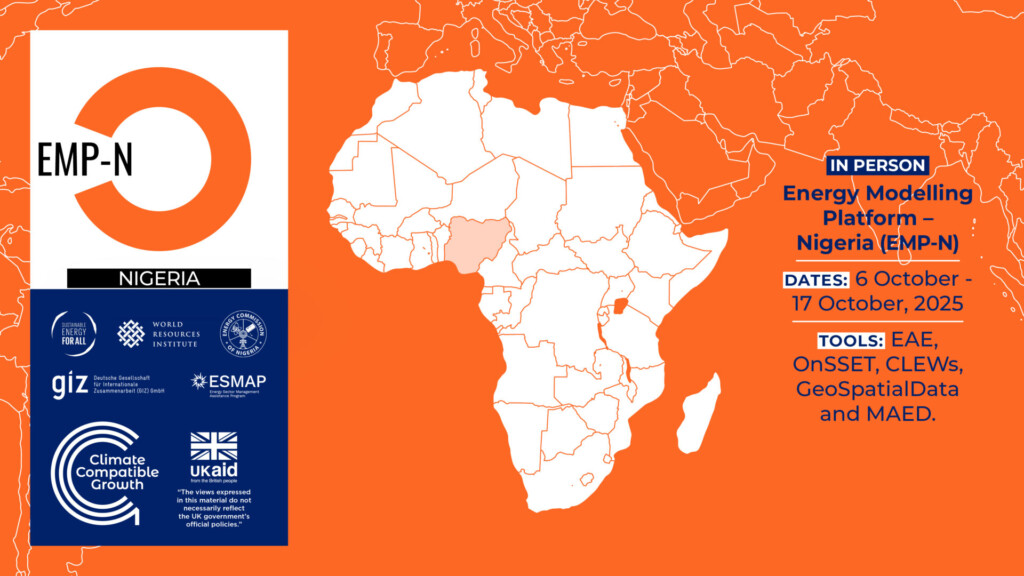The Energy Modelling Platform – Nigeria (EMP-N) is the first ever country specific EMP held by CCG and partners. Organisational partners include the Energy Commission of Nigeria, the World Resources Institute, Sustainable Energy for All, and the World Bank.
The country specific EMP initiative, following the massive success of the regional EMPs, aims to provide in depth capacity building to a specific country. EMP-N will aim to equip government analysts, academics, NGOs and the private sector of Nigeria with the neccesary tools, knowledge, and technical know-how to support the green energy transition in Nigeria in accordance with its development needs. Using country-specific data and open-source energy modelling tools provides the factual basis for achieving the above mentioned goals.

There is no fee to attend, however attendance to EMP-N is at your own cost, with only lunch being provided at the venue of the training.
Nigerian candidates will be prioritised; however, international applications are also welcome.
The overarching objectives of the EMP-N platform are to:
- Gather the energy planning and modelling community in Nigeria to share experiences, models, and data in climate, land, energy, and water systems.
- Support human and institutional capacity in Nigeria for integrated energy modelling and investment planning.
- Support the development of centres of excellence for energy planning in Nigeria
- Promote efficient and widespread use of (cost free) open-source modelling tools to support the implementation of the SDGs, the Paris Agreement, and Africa’s Agenda 2063
EMP-N 2025 will take place 6–17 October 2025 and is an in-person event, taking place at the Energy Commission of Nigeria Headquarters in Abuja, Nigeria.
The full concept note is available for download here
There are five courses available as part of this EMP. See below for details.
How to Apply
As part of the application, you will need to complete the Open University course for the tool you wish to be trained in.
For example: if you would like to apply for MAED, you would need to complete the course on the Open University website for MAED.
Once completed, you will receive a certificate from the Open University. The certificate must be attached to your application form.
All the courses are available free via the Open University (OU) [Links open in a new tab].
- Energy Access Explorer: Data-driven, Integrated and Inclusive Energy Planning
- MAED (Model for Analysis of Energy Demand)
- Introduction to CLEWS: Climate, Land-Use, Energy and Water Systems (also available in French)
- Geospatial Data Management for Energy Access Modelling and Planning
- OnSSET/The Global Electrification Platform
Application Period:
4 August 2025 to 26 September 2025

- 4 August 2025 – Applications open. Interested individuals should start the OU course to complete it before the application deadline.
- 26 September 2025 – Application deadline at 12pm GMT.
- 1 October 2025 – Participants are notified of whether their application was successful or not.
When you complete your application – USING THE LINK AT THE BOTTOM OF THIS PAGE – you must attach the following:
- A certificate of completion for the respective Open University course
- A certificate of completion for ‘Modelling, policy and political economy‘, a free Open University course. [all applicants]
- A stamped Letter of Commitment, which stipulates an express statement from your institution towards attendance for the module of choice. This letter must demonstrate that the output of your study is in demand by government/is policy-relevant research or that the skills you acquire will be used in university teaching/government planning.
- A Letter of Motivation in which you state why you should be selected for the course, and why your background knowledge and experience makes you ideal for the course.
Training Period
The courses are split into two parts:
Self-paced study: You complete an OU course of your choice and attach the certificate of completion.
In-depth hands-on training: In-person interactive training with dedicated trainers*. The coaching will help you develop a national case study, which you will then present as an ‘elevator pitch’ to a senior decision-maker.

- Week 1 of training, 6–10 October
Training and initial modelling begins - Week 2 of training, 13–16 October
Case study and presentations development - Presentation Day, 17 October
Participants present their case studies to fellow participants
Application Form
***Please follow this link to apply. [opens in new tab]***
Please note, you will need to submit all the required documents for your application to be successful. Applicants will need a relatively new computer (with at least 8 GB of RAM) and a stable internet connection in instances if online participation is accepted. Some courses have additional requirements.
If you have any questions about any part of the EMP-N please get in touch with OpTIMUS Inquiries.
Partners

In alphabetical order:
- 2050 Pathways Platform
- Centre for Global Equality
- Clean Cooking Alliance
- Climate Compatible Growth Programme (CCG)
- Department of Energy Security and Net Zero (DESNZ)
- Energy Sector Management Assistance Program (ESMAP)
- Energy Commission of Nigeria (ECN)
- GIZ (Deutsche Gesellschaft für Internationale Zusammenarbeit)
- Green Grid Initiative (GGI)
- International Atomic Energy Agency (IAEA)
- Imperial College London (ICL)
- International Energy Agency (IEA)
- International Renewable Energy Agency (IRENA)
- Kartoza
- KTH Royal Institute of Technology (KTH)
- Open University
- OpTIMUS Community of Practice
- Politecnico Di Milano
- Simon Fraser University
- Sustainable Energy for All (SEforALL)
- STEER (University of Loughborough Centre for Sustainable Transitions: Energy, Environment, and Resilience)
- United Kingdom Foreign, Commonwealth and Development Office (UK FCDO)
- United Nations Department of Economic and Social Affairs (UN DESA)
- United Nations Development Programme (UNDP)
- United Nations Economic Commission for Africa (UNECA)
- University of Cambridge
- University of Oxford
- University of Strathclyde
- World Resources Institute (WRI)
- World Bank Group (WBG)
